.jpg)
The Billionaire Space Race has captured the attention of the world, with billionaires like Elon Musk, Jeff Bezos, and Richard Branson leading the charge. But what exactly is this space race all about?
From commercial space travel to the colonization of other planets, the goals are ambitious and the ethical concerns are mounting. As we explore the potential benefits and risks, one question remains: What can we learn from past space exploration efforts and what does the future hold for this new galactic playground?
Join us as we uncover the untold truths of the Billionaire Space Race.
What Is the Billionaire Space Race?
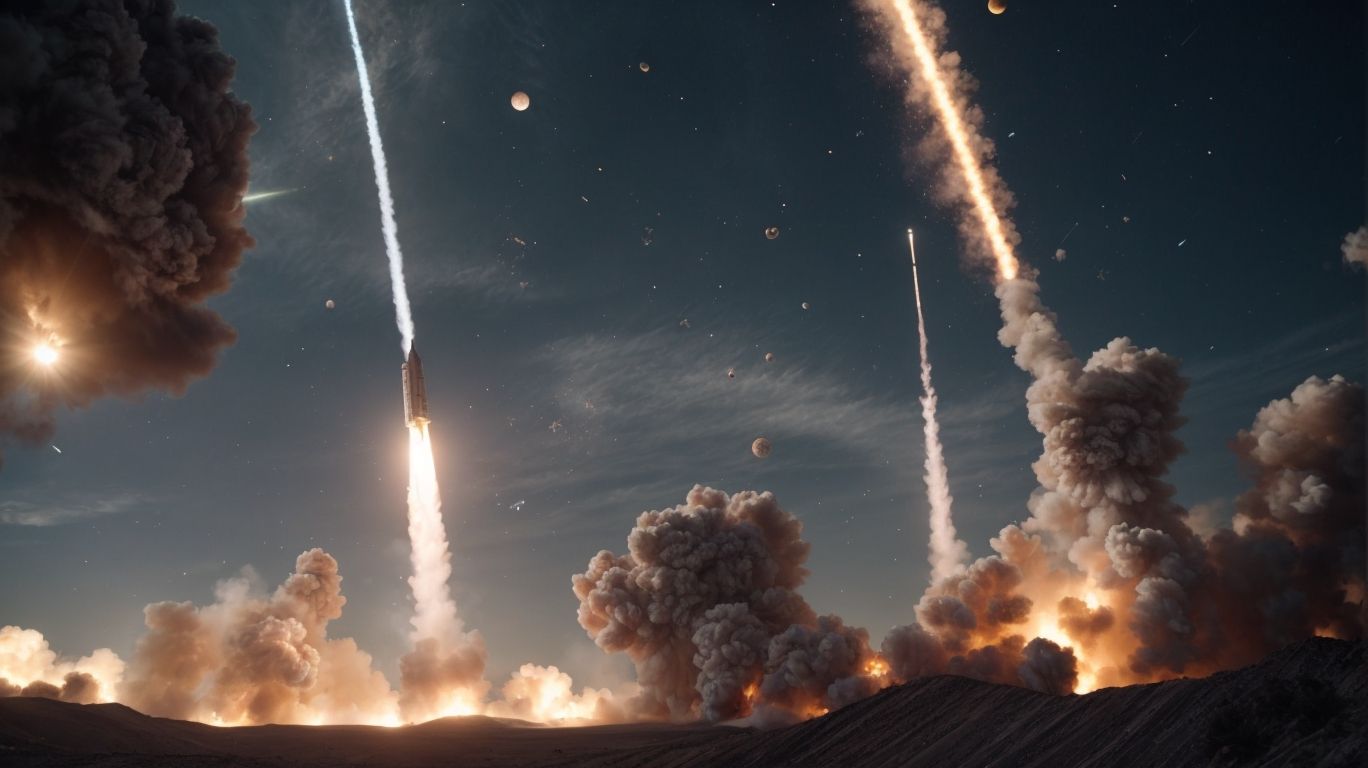
Credits: Gme.Ee – Jeremy Scott
The Billionaire Space Race refers to the competitive endeavors of billionaires like Elon Musk, Jeff Bezos, and Richard Branson to advance commercial space travel through their respective companies.
Each of these visionaries has poured resources into developing innovative technologies and spacecraft to push the boundaries of space exploration. Elon Musk’s SpaceX has revolutionized the industry with reusable rockets, drastically reducing costs and increasing launch frequency. Jeff Bezos’ Blue Origin aims to make space travel accessible to all, focusing on reusable rocket technology and space tourism. Richard Branson’s Virgin Galactic is geared towards commercial spaceflight for tourists, opening up the possibility of suborbital journeys for civilians.
This intense competition among the billionaire space pioneers has not only accelerated technological advancements in the sector but has also reignited public interest in space travel. As these industry giants strive towards their ultimate goals of colonizing Mars, establishing regular commercial spaceflights, and enabling space tourism, the world eagerly anticipates the next milestones in the Billionaire Space Race.
Who Are the Key Players in the Space Race?
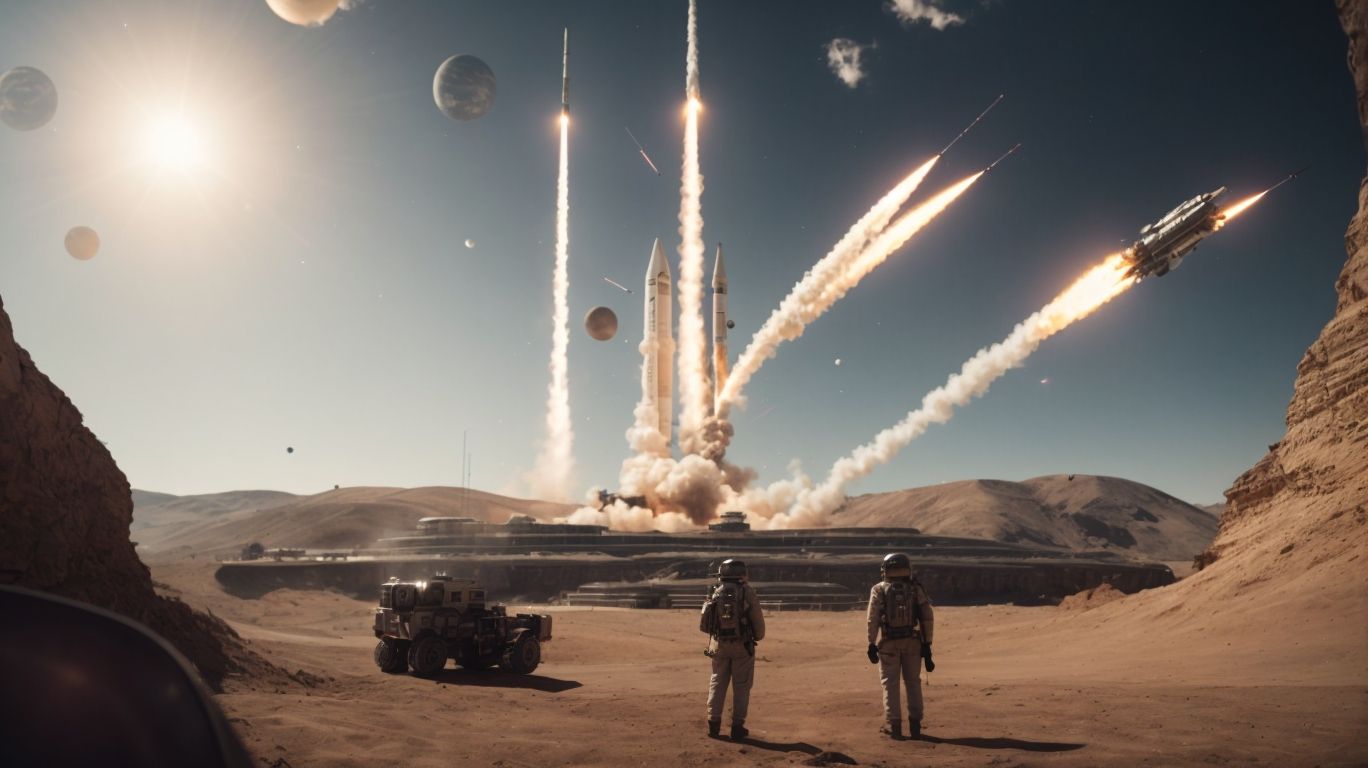
Credits: Gme.Ee – Dennis Carter
The Billionaire Space Race features prominent figures such as Elon Musk with SpaceX, Jeff Bezos with Blue Origin, and Richard Branson with Virgin Galactic leading the charge in modern space exploration.
Elon Musk, the visionary behind SpaceX, has revolutionized the aerospace industry with innovative approaches to rocket reusability and the goal of colonizing Mars, pushing boundaries in human spaceflight.
Jeff Bezos, through Blue Origin, focuses on reusable rocket technology and suborbital space tourism, aiming to make access to space more affordable and sustainable.
Richard Branson’s Virgin Galactic has made strides in commercial spaceflight, offering space tourism experiences and advancing the concept of space travel for civilians.
Elon Musk
Elon Musk, the visionary behind SpaceX, has revolutionized space travel with ambitious missions like crewed flights to the International Space Station and plans for Mars colonization.
His groundbreaking work has not only propelled the space industry forward but also solidified his reputation as a leading figure in the field.
SpaceX’s collaborations with NASA have been instrumental in reshaping the landscape of space exploration, with joint projects like the Crew Dragon missions opening up new possibilities for human spaceflight.
Musk’s relentless drive to push the boundaries of technology has led to remarkable advancements in crewed space missions, with innovations such as reusable rocket technology setting new benchmarks in affordability and efficiency.
Jeff Bezos
Jeff Bezos, through Blue Origin and projects like New Shepard, aims to drive commercial space exploration and expand humanity’s presence beyond Earth.
His vision transcends mere space tourism, as he envisions a future where space travel is accessible and commonplace for all. The New Shepard project, with its reusable rockets, plays a vital role in reducing the costs associated with space missions, thereby making space exploration more sustainable. Bezos’s commitment to innovation has propelled Blue Origin to the forefront of the space industry, inspiring a new wave of entrepreneurs and scientists to push the boundaries of what is possible in outer space.
Richard Branson
Richard Branson’s Virgin Galactic, with innovations like SpaceShipTwo, is at the forefront of space tourism, showcasing cutting-edge technology for commercial spaceflight.
Branson’s vision to democratize space travel has been a driving force behind the success of Virgin Galactic, as he aims to make space accessible for all. The SpaceShipTwo program represents a monumental leap in the field, with its revolutionary design and engineering feats paving the way for a new era of space exploration. Branson’s unwavering commitment to pushing the boundaries of what is possible in aerospace has inspired a new generation of space enthusiasts and investors, propelling the industry forward.
What Are the Goals of the Space Race?

Credits: Gme.Ee – Ralph Roberts
The Space Race aims to achieve goals like promoting commercial space activities, exploring colonization opportunities on other planets, and initiating resource mining endeavors in space.
One of the primary objectives of this modern Space Race is to foster innovation in the field of space technology and exploration. The focus is not only on governmental initiatives but also on encouraging private companies to actively participate in space ventures. These efforts are driven by a shared vision of expanding human presence beyond Earth and establishing sustainable habitats on celestial bodies like Mars or the Moon. The exploration of new territories in space paves the way for potential resource exploitation, presenting opportunities for extracting valuable minerals and materials from asteroids and planetary surfaces.
Commercial Space Travel
Commercial Space Travel is a key objective of the Space Race, with companies like SpaceX and Virgin Galactic pushing the boundaries of space tourism and interplanetary voyages.
SpaceX, founded by Elon Musk, stands out for its reusable rockets, drastically reducing the costs associated with space exploration.
Read more about the billionaire space race and what they’re not telling you about the new galactic playground.
On the other hand, Virgin Galactic, spearheaded by Richard Branson, focuses on suborbital spaceflights, aiming to make space travel accessible to civilians.
These advancements not only revolutionize the aerospace industry but also pave the way for a future where humanity could potentially colonize other planets.
Colonization of Other Planets
Colonization of Other Planets is a bold ambition within the Space Race, with pioneers like Elon Musk envisioning sustainable human settlements on Mars and beyond.
These ambitious plans are not merely science fiction dreams but represent tangible goals that are being actively pursued by private space companies and government space agencies alike. Elon Musk’s company, SpaceX, is at the forefront of this endeavor with its ambitious Starship spacecraft, designed to transport large numbers of people to destinations like Mars.
Establishing human habitats on another planet comes with a myriad of challenges, from ensuring a sustainable food supply to creating suitable living conditions in harsh environments. The success of these missions will not only mark a giant leap for humanity but also pave the way for future generations to explore interplanetary travel and potentially seek out habitable worlds beyond our solar system.
Resource Mining in Space
Resource Mining in Space presents a futuristic goal for the Space Race, with innovators like Musk and Bezos exploring the potential of harvesting resources from asteroids and celestial bodies.
This strategic objective aims to transform the way we understand space exploration and colonization, shifting from a narrative of pure discovery to one of resource utilization and sustainability. The vision of extracting minerals and elements such as platinum, rare earth metals, and water from space sources not only fuels scientific curiosity but also holds immense potential for fueling future space missions and supporting life beyond Earth. Musk’s SpaceX and Bezos’ Blue Origin have spearheaded initiatives to establish infrastructure and technologies for extracting and processing resources in space, marking a new era of human presence in the cosmos.
What Are the Ethical Concerns Surrounding the Space Race?
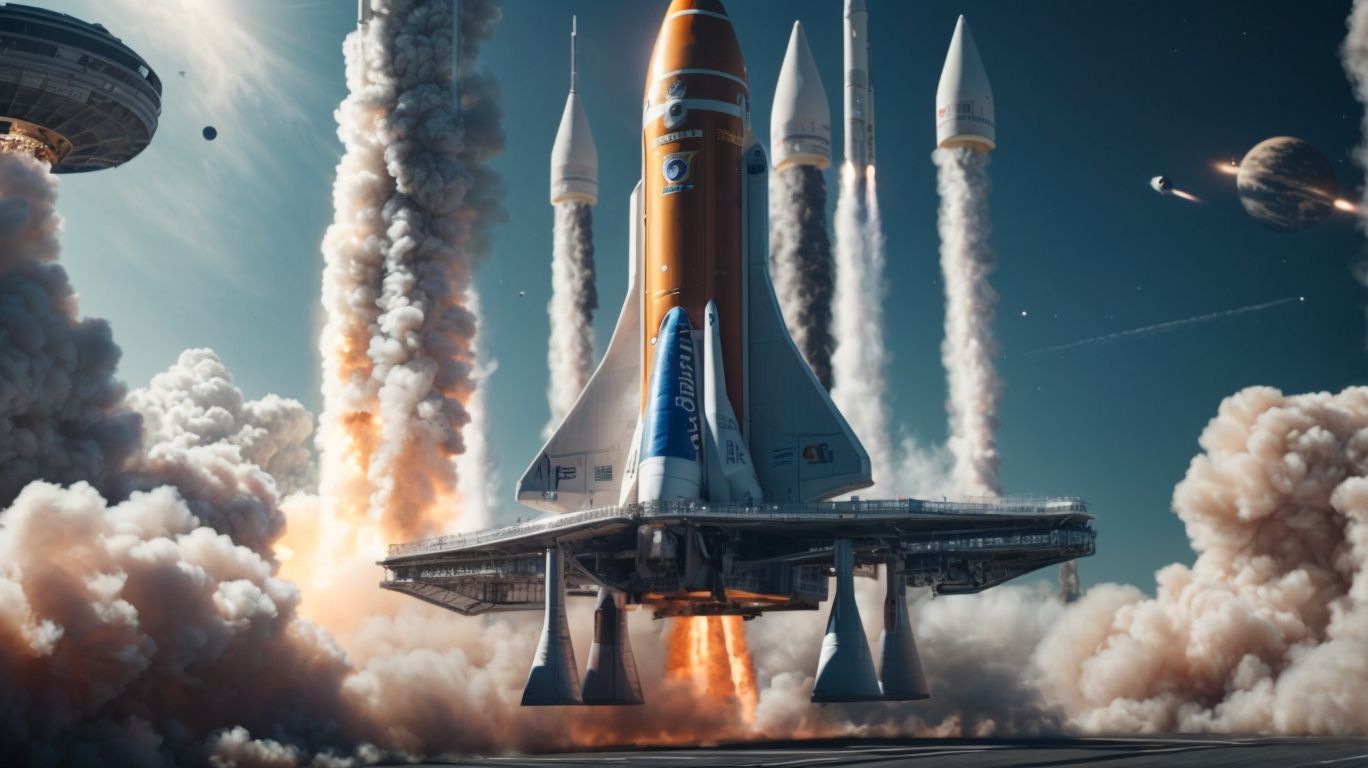
Credits: Gme.Ee – Kenneth Robinson
The Space Race raises ethical concerns such as the privatization of space exploration, environmental implications of space activities, and the potential for space weaponization, prompting reflection on the responsibilities of key players like Musk, Bezos, and Branson.
As commercial space ventures continue to grow, questions surrounding corporate influence in the final frontier gain significance. The commercialization of space could have wide-ranging implications, from ownership rights on celestial bodies to the exploitation of extraterrestrial resources.
Elon Musk, Jeff Bezos, and Richard Branson face decisions that could shape the ethical landscape of space endeavors for generations to come. The potential consequences of their actions, both positive and negative, extend beyond Earth’s atmosphere, impacting international relations and the very nature of humanity’s exploration of the cosmos.
Privatization of Space Exploration
Privatization of Space Exploration has sparked debates within the Space Race, as Musk, Bezos, and Branson lead commercial ventures that challenge traditional government-led space programs.
The rise of private companies like SpaceX, Blue Origin, and Virgin Galactic has revolutionized the space industry, introducing innovative technologies and approaches to space exploration.
This shift from government-dominated initiatives to commercial space enterprises has brought about a new era of competition and collaboration in the quest for reaching beyond Earth’s atmosphere.
The success of private companies in launching satellites, manned missions, and exploring the potential for space tourism has redefined the possibilities and the future trajectory of space exploration.
Environmental Impact of Space Activities
The Environmental Impact of Space Activities is a growing concern in the Space Race, pushing Musk, Bezos, and Branson to address sustainability challenges associated with space exploration and commercial spaceflight.
Space activities have the potential to cause significant harm to our planet in terms of space debris, atmospheric pollution, and resource depletion. As Musk’s SpaceX, Bezos’ Blue Origin, and Branson’s Virgin Galactic compete in the space market, there is a heightened focus on reducing the ecological footprint of their missions.
Efforts such as developing reusable rockets, promoting clean technologies, and implementing strict waste management policies are steps taken towards a greener space industry. These visionaries understand the critical need to protect Earth while venturing into the cosmos.
Space Weaponization
Space Weaponization poses complex challenges for the Space Race, as Musk, Bezos, and Branson navigate the delicate balance between innovation, national security concerns, and international regulations.
The development and potential deployment of space weapons have sparked debates around sovereignty, militarization, and peaceful exploration of outer space. Space militarization involves not just the creation of weaponry but also the strategic implications for different nations and their security postures. As countries like the United States, China, and Russia invest heavily in space capabilities, the need for robust regulatory frameworks to prevent an arms race in space becomes increasingly urgent.
What Are the Potential Benefits of the Space Race?
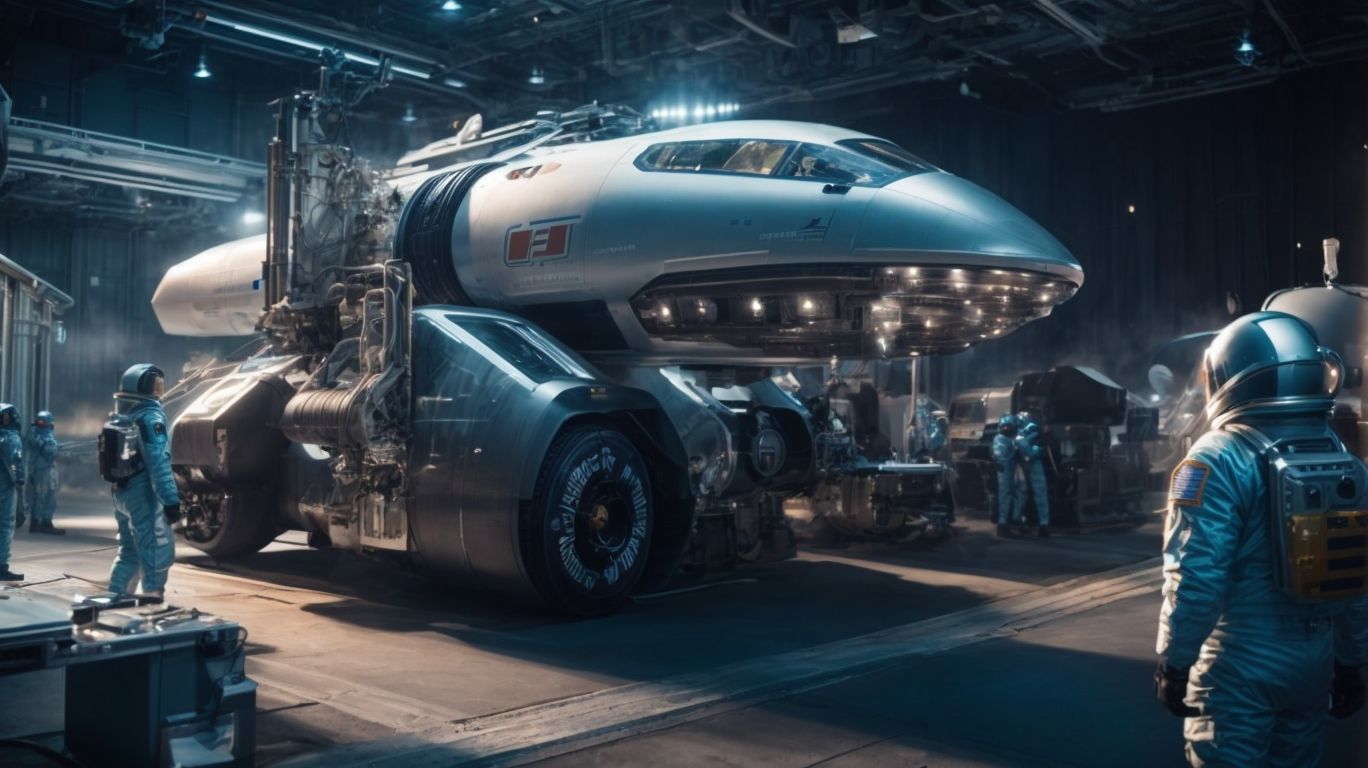
Credits: Gme.Ee – Nathan King
The Space Race offers prospects for technological advancements, economic prosperity, and groundbreaking scientific discoveries, driven by the innovative pursuits of Musk, Bezos, and Branson.
Space exploration has not only inspired humanity to reach beyond terrestrial limits but has also catalyzed the development of revolutionary technologies. The endeavors of Musk, Bezos, and Branson in the aerospace industry have led to cutting-edge spacecraft designs and propulsion systems that are pushing the boundaries of human space travel. This pioneering spirit has not only revitalized public interest in space but has also attracted considerable investment, spurring job creation and economic growth in the space sector.
Technological Advancements
Technological Advancements spurred by the Space Race are reshaping industries and pushing boundaries in innovation, exemplified by the transformative endeavors of Musk, Bezos, and Branson.
This era witnesses a convergence of cutting-edge technologies, private sector initiatives, and government collaborations, fostering a space race that seeks to make space more accessible and sustainable. Space exploration has ceased to be a distant dream but is increasingly becoming a reality with ambitious projects aiming to colonize Mars, mine asteroids, and establish space tourism. Visionaries like Musk, Bezos, and Branson, through SpaceX, Blue Origin, and Virgin Galactic respectively, have galvanized the space industry with their pioneering efforts in reusable rockets, satellite deployment, and space tourism.
Economic Growth
Economic Growth stimulated by the Space Race is evident in the flourishing space industry and commercial ventures spearheaded by visionaries like Musk, Bezos, and Branson.
The space industry has become a hotbed of entrepreneurial activity, attracting not only seasoned players but also a wave of innovative startups looking to establish their presence in the cosmos. This boom in space-related enterprises has created a ripple effect across various sectors, from advanced technology development to satellite manufacturing and deployment.
Entrepreneurs such as Elon Musk, Jeff Bezos, and Richard Branson have redefined the boundaries of space exploration by injecting private capital and out-of-the-box thinking into an industry traditionally dominated by government agencies. Their companies, such as SpaceX, Blue Origin, and Virgin Galactic, have not only accelerated technological advancements but also opened up new avenues for space tourism and resource exploitation.
Scientific Discoveries
Scientific Discoveries facilitated by the Space Race are expanding our understanding of the universe and driving groundbreaking research initiatives under the guidance of Musk, Bezos, and Branson.
In the realm of space exploration, Musk’s SpaceX has been at the forefront, revolutionizing the aerospace industry with reusable rockets and ambitious missions to Mars. Bezos’ Blue Origin, on the other hand, has placed a strong emphasis on commercializing space travel, aiming to provide affordable access beyond Earth’s atmosphere. Branson’s Virgin Galactic has focused on space tourism, offering civilians the chance to experience spaceflight firsthand. These visionary leaders have revitalized interest in space, sparking innovation in propulsion, materials science, and robotics. Their collective efforts are paving the way for future space colonization and interplanetary travel.
What Are the Potential Risks of the Space Race?
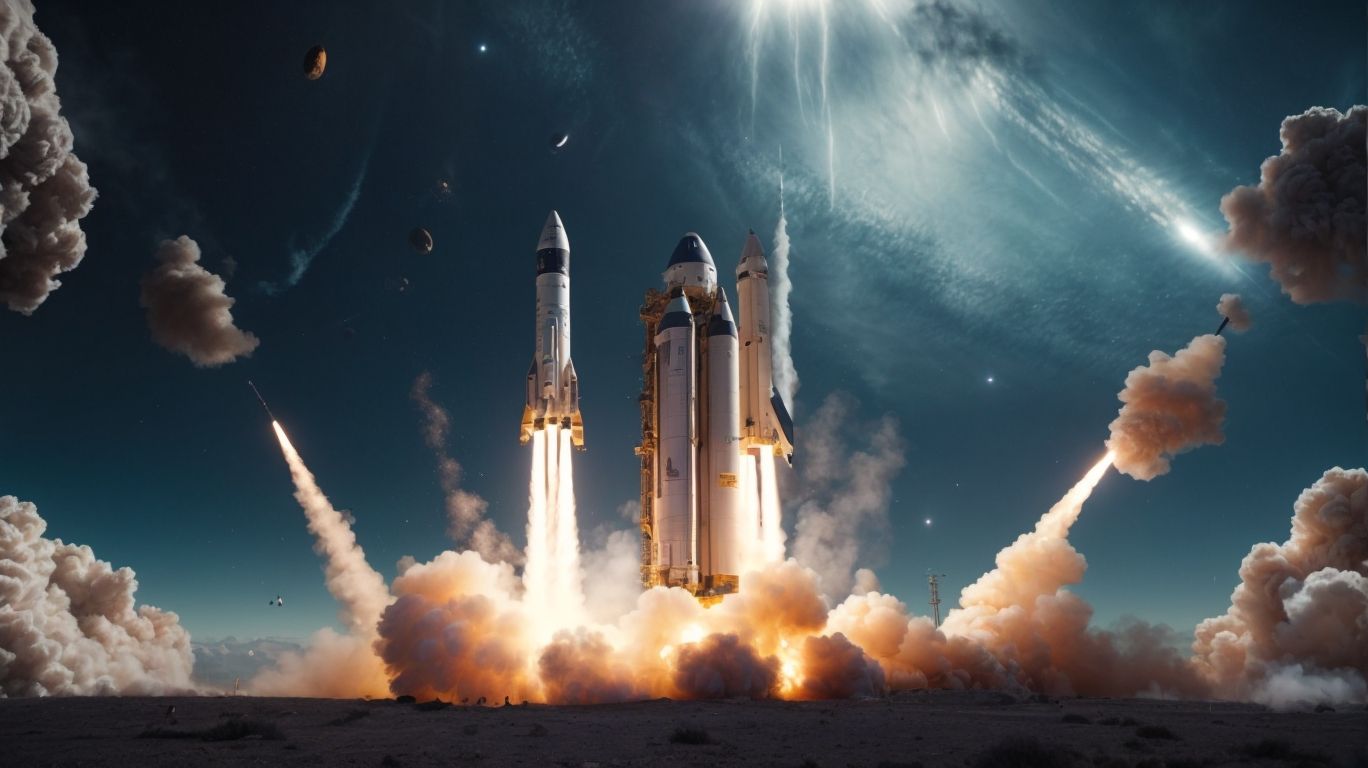
Credits: Gme.Ee – George Rodriguez
The Space Race carries inherent risks such as space debris proliferation, resource exploitation concerns, and national security implications, prompting vigilance from Musk, Bezos, and Branson.
Space debris is a major concern as defunct satellites and debris pose navigation hazards for operational spacecraft. In addition, the ethical dilemma of resource exploitation in space raises questions regarding sustainability and equity. The potential security risks involving space technologies could lead to geopolitical tensions and conflicts.
Elon Musk’s SpaceX, Jeff Bezos’ Blue Origin, and Richard Branson’s Virgin Galactic play pivotal roles in addressing these precarious situations by advocating for stricter regulations on space debris mitigation, pursuing sustainable resource extraction methods, and collaborating with governmental authorities to safeguard against security threats.
Space Debris and Pollution
Space Debris and Pollution pose environmental threats in the Space Race, necessitating sustainable practices and debris mitigation strategies championed by Musk, Bezos, and Branson.
As the race to conquer space intensifies with commercial and governmental entities launching satellites, human-made debris continues to accumulate in Earth’s orbit. This accumulation not only poses a risk to existing spacecraft but also threatens to exacerbate the issue of space pollution. Space debris ranges from defunct satellites to remnants of rocket stages, posing collision hazards that can create even more fragments. To address this alarming issue, visionaries like Musk, Bezos, and Branson have taken proactive steps towards sustainable space practices and innovative debris mitigation solutions.
Exploitation of Resources
The Exploitation of Resources in the Space Race raises ethical concerns regarding equitable resource utilization, prompting ethical considerations and responsible practices advocated by Musk, Bezos, and Branson.
As the space industry continues to expand and evolve, the extraction and management of resources beyond Earth’s boundaries become increasingly feasible, sparking debates about environmental impacts and fair distribution of extraterrestrial wealth. Ethical dilemmas surrounding resource exploitation in space activities revolve around issues of sustainability, ownership, and the potential for exacerbating inequalities both on Earth and in space. Visionaries like Musk, Bezos, and Branson emphasize the importance of responsible resource utilization, calling for the establishment of ethical guidelines to govern space ventures and ensure that the benefits are shared equitably among nations and future generations.
National Security Concerns
National Security Concerns in the Space Race underscore the delicate balance between innovation and safeguarding national interests, requiring collaborative efforts and regulatory frameworks endorsed by Musk, Bezos, and Branson.
Amidst the relentless quest for space exploration advancements, the challenges of maintaining security have come to the fore. As private entities like SpaceX, Blue Origin, and Virgin Galactic propel the frontier of space endeavors, the need for stringent regulations becomes paramount. Ensuring the peaceful and safe utilization of outer space is not only a matter of national security but also a global imperative.
International cooperation is pivotal in preventing conflicts and promoting transparency in activities that venture beyond our planet. Musk, Bezos, and Branson, as influential figures in the space industry, bear a responsibility in advocating for adherence to regulatory frameworks to avoid potential threats that could arise from unchecked actions in space.”
What Can We Learn from Past Space Exploration Efforts?
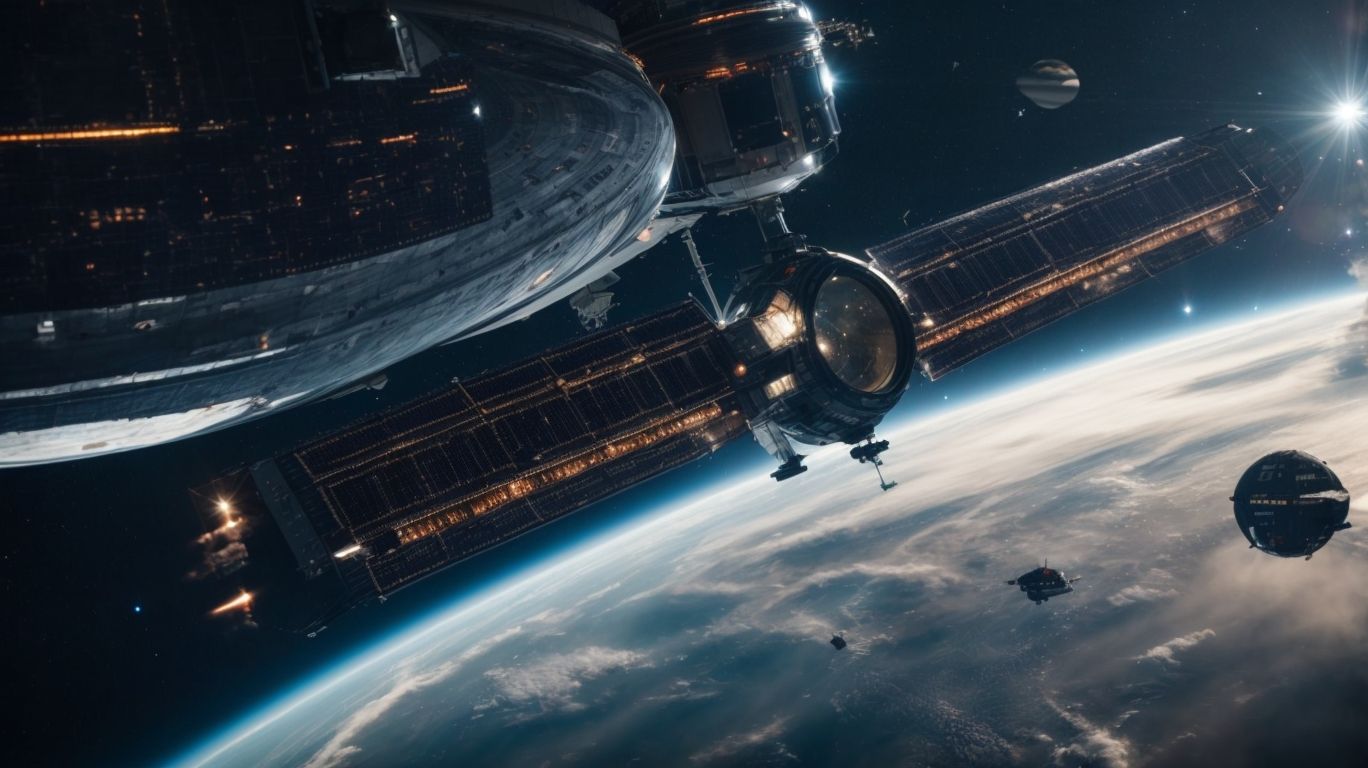
Credits: Gme.Ee – Matthew Lopez
Reflecting on Past Space Exploration Efforts, such as the Apollo program, offers valuable lessons for current space pioneers like Musk, Bezos, and Branson to guide their future endeavors and innovations.
Examining the Apollo program, which successfully landed humans on the Moon in 1969, sheds light on the meticulous planning, intense teamwork, and groundbreaking technological advancements that made such a feat possible.
The commitment to exploration displayed during the Apollo era continues to inspire contemporary figures like Elon Musk, Jeff Bezos, and Richard Branson, who are pushing the boundaries of space travel with their companies, SpaceX, Blue Origin, and Virgin Galactic, respectively.
What Does the Future Hold for the Billionaire Space Race?
The Future of the Billionaire Space Race appears dynamic and promising, with Musk, Bezos, and Branson pursuing innovative projects and operational expansions that could redefine the future of space exploration and commercial ventures.
Elon Musk’s SpaceX is actively working on Mars colonization plans and the Starship project, which aims to establish a sustainable human presence on the Red Planet. Jeff Bezos’ Blue Origin focuses on developing reusable space technologies, such as the New Glenn rocket, to lower the cost of access to space. Richard Branson’s Virgin Galactic envisions space tourism and point-to-point suborbital travel with its SpaceShipTwo vehicle.
These visionary endeavors are poised to not only push the boundaries of space exploration but also open up new avenues for commercial space activities, including satellite launches, space tourism, and potentially mining asteroids for precious resources.